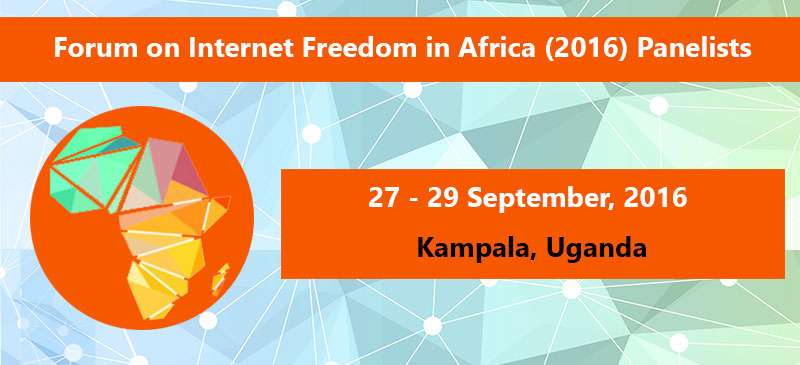 Tefo is the founder & CEO of iAfrikan, a Pan-African technology company that produces content, podcasts, events, publications and other services about Afrika’s burgeoning innovation and technology sector and how it affects culture, business and day to day life on the continent. iAfrikan is also the technology partner to University of the Witwatersrand on the Xenowatch.org project in partnership with UNHCR.
Tefo is the founder & CEO of iAfrikan, a Pan-African technology company that produces content, podcasts, events, publications and other services about Afrika’s burgeoning innovation and technology sector and how it affects culture, business and day to day life on the continent. iAfrikan is also the technology partner to University of the Witwatersrand on the Xenowatch.org project in partnership with UNHCR.
Forum on Internet Freedom in Africa 2016 Panelists
We have an exciting line up of panelists from over 46 organisations from across Africa and beyond! See who they are, where they are from and what they do. Be sure to connect with them too and join the conversation on #InternetFreedom in Africa using the #FIFAfrica16 hashtag. Follow @cipesaug for updates.
Forum Panelists
[search_live]
Nanjira Sambuli – Advocacy Manager, Web Foundation
 Nanjira is a researcher, policy analyst and advocacy strategist interested in and working on understanding the unfolding impacts of ICT adoption and how those impact governance, innovation, entrepreneurship and societal culture, with a keen focus on gender implications.
Nanjira is a researcher, policy analyst and advocacy strategist interested in and working on understanding the unfolding impacts of ICT adoption and how those impact governance, innovation, entrepreneurship and societal culture, with a keen focus on gender implications.
She is currently the Digital Equality Advocacy Manager at the Web Foundation, where she manages advocacy efforts to promote digital equality in access to and use of the Web, with a particular focus on the Foundation’s Women’s Rights Online work. She was previously the Research Lead at iHub, Nairobi, where she provided strategic guidance for growth of technology research in the East Africa region and supported the team to surface information useful for the emerging technology ecosystem in Africa.
Nanjira is also a Trustee at mySociety (UKCOD), sits on the Advisory Board (Africa) for Sum of Us, and is also a board member at Kenya’s Media Policy Research Centre, with whom she has published a working paper on the changing media landscape in the country as impacted by social media. She is supporting the UN High Level Panel on Women’s Economic Empowerment by working with various leaders to demonstrate high-level leadership and renewed commitment and action towards making women’s economic empowerment a reality in our lifetime.
Moses Karanja – Research Fellow, Strathmore Law School
 Moses is a political scientist working on policy processes around information communication technologies. He is currently a research fellow at the Centre for Intellectual Property and Information Technology Law (CIPIT) based at the Strathmore Law School in Nairobi, Kenya.
Moses is a political scientist working on policy processes around information communication technologies. He is currently a research fellow at the Centre for Intellectual Property and Information Technology Law (CIPIT) based at the Strathmore Law School in Nairobi, Kenya.
He is also the curator of ictpolicy.org a repository aggregating ICT laws and policies in Africa and the co-founder of Jadili, a public platform powering remote participation in shaping proposed laws through aggregation of annotations and commentary by relevant public(s).
Further, Moses specialises in information controls and counter-controls, privacy, human rights in the digital ecosystem, cybersecurity, Eastern Africa, multidisciplinary research and their attendant policies. I also happen to know of good coffee from a distance, if that counts.
Enrico Colandro – Senior researcher, Research ICT Africa
 Enrico Calandro (PhD) is a senior researcher at Research ICT Africa. Prior to joining Research ICT Africa, he worked as a technical advisor for the ICT programme of the SADC Parliamentary Forum in Namibia, within the UN technical cooperation framework. He also has experience in the ICT private sector as a business developer.
Enrico Calandro (PhD) is a senior researcher at Research ICT Africa. Prior to joining Research ICT Africa, he worked as a technical advisor for the ICT programme of the SADC Parliamentary Forum in Namibia, within the UN technical cooperation framework. He also has experience in the ICT private sector as a business developer.
He has worked for the European Commission, Information Society and Media DG as a trainee after completing his Master’s degree. He holds a PhD in Business Administration specialising in telecommunications policy from the Graduate School of Business, University of Cape Town, and a Master degree in Communications’ sciences from the University of Perugia, Italy. He is a recipient of the OTF fellowship on information controls, the Amy Mahan scholarship award for the advancement of ICT policy in Africa, and the UNDESA fellowship for international cooperation.

